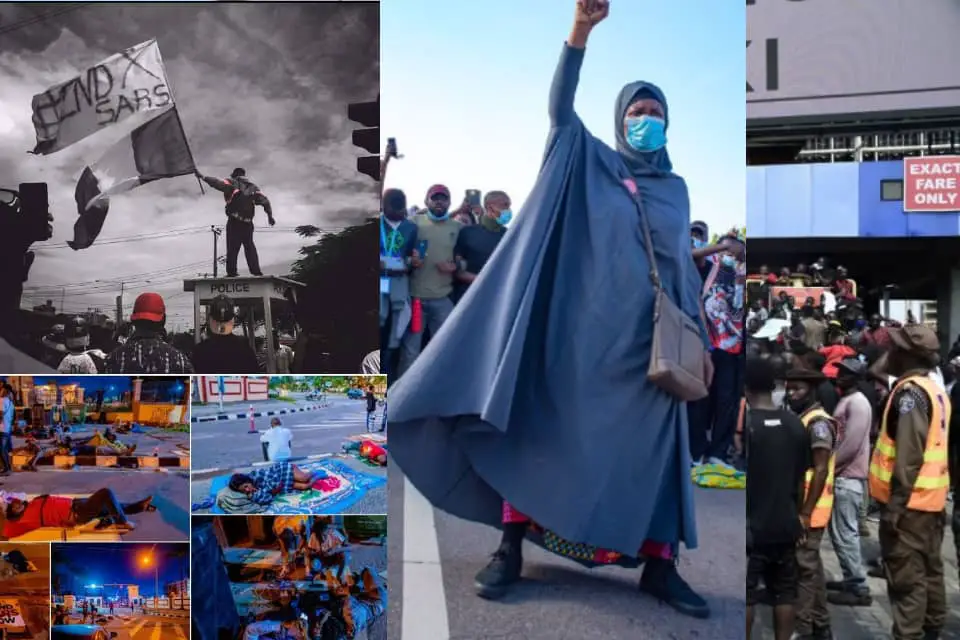The world saw one of the largest offline and online movement of Nigerian youths in the first weeks of October 2020 with the #EndSARS protests. This was not the first time that the #EndSARS hashtag has appeared online, however, the youths are moving to make sure that this is the last time that it ever surfaces without having their demands met.
SARS, meaning Special Anti-Robbery Squad, was a unit of the Nigerian Police Force that was initially created to combat violent crimes. However, the unit has long degenerated into terrorising the citizens, which has led to great distress and dissatisfaction among the general Nigerian populace.
In this article, we give details about the #EndSARS protests starting from background information about SARS; how the protests started; casualties so far and more.
10 important facts about #EndSARS
- SARS means Special Anti-Robbery Squad and it is a unit of the Nigerian Police Force.
- According to sources, SARS was founded by a former police commissioner, Simeon Danladi Midena.
- SARS officers have been accused of harassment and extra-judicial killings of Nigerian youths.
- The notorious Nigerian Police Force unit, SARS, has killed about 30+ Nigerian youths with names known and several unnamed others.
- Protests against SARS began with the hashtag, #EndSARS, since 2017.
- In 2020, a mass online and offline protest against the rogue police unit, SARS, kicked off in Lagos State on Thursday, 8th October 2020.
- The #EndSARS protests spread to other parts of Nigeria and by 15th October 2020, there were protests in nine or more states in the country.
- The hashtags relating to the protests, #EndSARS, #SARSMUSTEND, and #EndSWAT topped world trends on Twitter.
- Nigerian police officers killed about 10 people during the SARS protests of 2020.
- Inspector General (IG) of Nigeria Police Force, Mohammed Adamu announced that the Special Anti-Robbery Squad (SARS) has been dissolved on Sunday 11th October 2020.
Also read: Revisiting history from the perspective of British 1948 ‘Challenges in Nigeria’ documentary [VIDEO]
Special Anti-Robbery Squad (SARS) background
Originally, when the Nigerian Police Force was formed in 1820, there was no such thing as the Special Anti-Robbery Squad or SARS. In fact, this unit did not come into existence until as recently as 1992.
According to online sources, SARS was formed after a Nigerian Army Colonel, Rindam, was killed at a police checkpoint in Lagos State. The death of Rindam led to soldiers being dispatched into the streets to find the police offending policemen. Allegedly, police checkpoints vanished from roads, many officers resigned and fled.
Simeon Danladi Midena, who was the police commissioner at the time, formed a 15-man squad. Their duties included operating without the knowledge of the public and protecting the police interests against the Nigerian army.
At the time, the Nigerian Police already had some anti-robbery squad units. To set this new mythical unit aside, Midena named them the Special Anti-Robbery Squad and the acronym, SARS was born. After the Nigerian army and the police settled their differences over Rindam’s death, SARS was officially commissioned.
It is one of the 15 units or sections under the Nigerian Police Force which includes some of the following; Anti-Fraud Section, Special Fraud Unit (SFU), Forensic Science Laboratory, Homicide, Counter Terrorism Unit (CTU), and so on.
However, Fulani Kwajafa, a former commissioner of police claims to have created the Special Anti-Robbery Squad (SARS) unit. In an interview with BBC, Kwajafa said Muhammadu Buhari, then military head of state ordered Etim Inyang, then inspector-general of police, to come up with a strategy to tackle the armed robbery incidents prevalent in the country in the 1980s.
“The IGP called me that we should do something to save the country from armed robbery incidents; I accepted the offer and requested for time and materials. I then mobilised personnel for the task,” he said.
“Four months after the formation of SARS in 1984, the unit flushed out the criminals and there was peace.”
He added: “SARS of today is not the same SARS I established in 1984. This is not the SARS we formed in the 80s, I used to be ashamed that I am the person that created the SARS because of their activities, had it been I knew such things would happen, I would not have created the unit. I always tell my wife that I was sad that what I created with good purpose and direction has been turned into banditry.”
Likely, this is the already existing SARS that Simeon Danladi Midena’s unit joined.
SARS has long since become a disruptive force in the Nigerian society wreaking havoc on people, especially the youths in the country. In the next section, we will look at a brief history of violent crimes that have been connected to this Special Anti-Robbery Squad.
History of SARS violence
While SARS has existed for a long time, many of their activities have usually been very low key and do not get the attention of the press. For a long time, they seemed to have maintained their original ideology of operating ‘in the shadows’. Tales about the Special Anti-Robbery Squad were normally passed by word of mouth in the late 1990s and early 2000s.
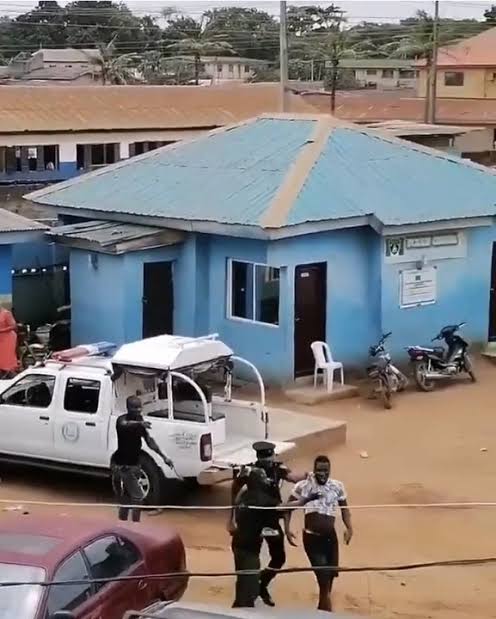
However, with the popularity of cybercrime and the internet, SARS began investigating tech-savvy youths and university undergraduates. Before, they focused on breaking up armed robbery operations and kidnapping rings. Soon, their interests diverged.
You may also read: Nigerian football star Tiyamiyu Kazeem allegedly killed by SARS; Nigeria Police reacts
Their stop and search activities became more ruthless as the years progressed. And while it began in Lagos State, it spread to other states in Nigeria. Notably, in 2009, SARS started to carryout brute operations in Nigerian universities, under the guise of targeting internet fraudsters and cultists.
By 2020, there are over 30+ victims of the Special Anti-Robbery Squad, SARS, that were known. And likely, there are many more that remained unknown.
Some known names of police brutality and SARS extra-judicial killings that we found online include Femi Bello, Sleek, Chima Ikwunado, Ifeoma Abugu, Tamiyu Kazeem, Johnson Kolade, Rinji, Tina Ezekwe, Peter Ofurum, Linda Igwetu, Chinedu Ani, Modebayo Awosika, Emmanuel Egbo, Godgift Ferguson Ekerete, Tony Oruama, Harry Atarta, Daniel Adewuyi, Tella, Chukwuemeka Matthew Onovo, Chibuike Anams, Christian Onuigbo, Chika Ibeku, Gabriel Ejoor Owoicho, Precious Odua, Johnson Nnaemeka, Steven Agbanyim, Chidi Odinauwa, Azumaka Victor Maduamago, and many unnamed victims.
Initial #EndSARS protests
Before the 2020 protests against SARS and police brutality in general, there have been several calls to disband the unit. For example, Amnesty International has been publishing reports and articles about SARS since 2016.
The organisation accused the unit of illegally detaining Nigerian youths, extorting them and subjecting them to severe torture. Several young Nigerians, who experienced different ordeals at the hands of SARS officials, had also come out to share details via social media.
In 2017, several Twitter handles tweeted the #ENDSARS hashtag and also posted about it on several other social media platforms as well. It led to protests springing up in Nigeria against police brutality. However, the unit remained in existence despite reports that they had been ordered to curtail their activities.
2020 #EndSARS protests
A series of incidents led to the resurgence of the protests to end SARS in 2020. While there had been some killings linked to the menacing police unit since the beginning of 2020, however, when a popular singer, Sleek, was gunned down on 19th September 2020, youths showed that they have had enough.
Daniel Ikeaguchi, popularly called Sleek, was fatally shot in Port Harcourt, the capital city of Rivers State after SARS officials stopped him and his friends. The state governor, Nyesom Wike, called for the dissolution of SARS according to a report by Vanguard newspapers. Angry youths also took to the streets in protests.
Not quite long after this incidence, a viral video on social media showed a SARS operative gun down a young man in Ughelli, Delta State. The officer and other colleagues also appeared to have driven away with the victim’s white Lexus SUV. The video trended on 3rd October 2020 and resurrected the #ENDSARS hashtag.
Then everything seemed to be returning to a state of normalcy until 8th October 2020 when nationwide protests led by Nigerian youths erupted. The first notable evidence of the 2020 EndSARS protests began in Lagos.
Lagos State EndSARS protest 2020
On 8th October 2020, the EndSARS protests began offline when some Nigerian youths in Lagos State went to the Governor’s House with placards. One of the most notable faces on the first day of the EndSARS protest was social media comedian and influencer, Debo Adebayo, who is popularly called Mr Macaroni. The protesters kept their voices up, chanting their demands until dusk and they spent the whole night outside the building.
By dawn, the number of protesters increased astronomically that they could no longer be ignored. That day, the protests in Lagos was no longer in one spot but were taking place in different locations. Protesters were occupying streets and roads on the Mainland and on the Island, the two major geographical locations of the commercial state.
Celebrities like Runtown, Falz, and others came out on 9th October to increase the reach of the protest and to encourage more people to join. This was exactly what happened. The deputy governor of Lagos State, Dr Obafemi Hamzat, came out to address the protesters.
The weekend did nothing to dampen the zeal of the youths. They carried on protesting all through.
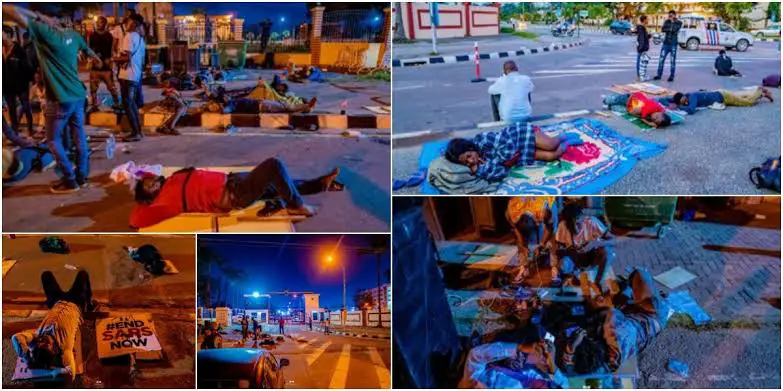
EndSARS Protesters sleeping at protest grounds. On Sunday 11th October 2020, #EndSARS and #EndPoliceBrutality appeared on the projector screens of some churches in Lagos. Some of them with picture evidence include that of the Redeemed Christian Church of God (RCCG), Daystar Christian Center, and Celestial Church of Christ (CCC).
On Monday 12th October 2020, the protests in Lagos State took a dangerous turn as police shot one person dead in Surulere. There were also videos of people being manhandled, arrested and beaten. At the end of that day, about four protesters were reported to have been injured.
See also: Pastor Adeboye joins #EndSARS protest
The protests continued on Tuesday and Wednesday in the state without fatalities. On Thursday 15th October 2020, a Lagos State bus was caught on video dropping thugs off at the government area of Alausa, Ikeja. Hours later, the same armed thugs clashed with peaceful protesters and left many injured. Eventually, the protesters repelled the miscreants and continued their protest.
The state governor, Babjide Sanwo-Olu, responded to the incident by absorbing his government of any responsibility concerning the attack. He condemned it and promised to look into the matter. Governor Sanwo-Olu also stated that he will address the residents of Lagos State later via a live-streamed discussion.
On 16th October 2020, protesters held a candlelight session throughout the night at Lekki tollgate and the billboard showed the names of victims of police brutality. The protesters at the Lekki tollgate mounted a peaceful resistance to the Lagos State government opposition.
It turned bloody on 20th October 2020, when armed forces opened fire on the peaceful protesters. According to online sources such as an Instagram live video by DJ Switch and other witnesses accounts, about 12 people died and over 50 others were injured.
The Lagos State governor, Babajide Sanwo-Olu, claimed that there were no casualties during a live broadcast the next morning. He only claimed that he had seen injured people in varying degrees of seriousness. Later, he said that one person died from injuries.
The Nigerian Army also denied having anything to do with the killings of peaceful protesters at the Lekki tollgate. This is contrary to the fact that the shooters were dressed in Nigerian army camouflage and met no resistance from other armed forces all through the night.
Also, thugs and hoodlums began clashing with the Nigerian Police Force. The situation further escalated on 21st October 2020 with video clips showing police officers shooting and killing thugs while the thugs also killed policemen and burnt police stations. They also started looting properties and destroying buildings in Lagos State.
Additionally, they stormed the Oba of Lagos’ palace and burnt the Television Continental Station (TVC) building and others that were connected to All Progressives Congress (APC) national leader, Bola Ahmed Tinubu.
Abuja EndSARS protest 2020
Nigerian youths also staged protests in the Federal Capital Territory (FCT) since Friday, 9th October 2020. They began the protest at the headquarters of the Nigeria Police Force on the first day. The next day, on Saturday, officers attached to the police attacked the peaceful protesters with tear gas and hot water.
Aisha Yesufu, who joined the protesters was among those who were beaten. The protest also gathered momentum and Nigerian singer David Adeleke, popularly called Davido, joined the protesters. Later on the night of Sunday 11th, October 2020, police returned and this time, they used real bullets, tear gas and water cannons on the protesters.
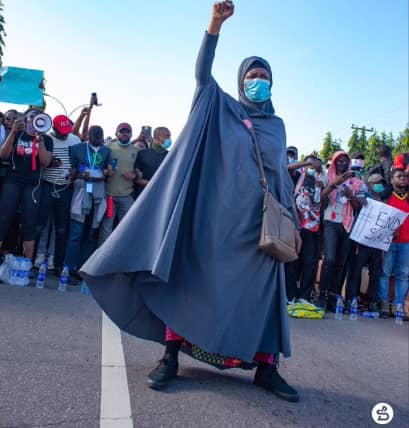
Abuja protesters, calling for the dissolution of the Nigerian Police Force SARS unit, blocked the busy Berger roundabout. On Tuesday 13th October 2020, soldiers met them on their way towards the National Assembly. They got violent with the protesters and also harassed the crew of ARISE TV, a media house in Nigeria.
A counter-protest group supporting the Inspector General of Police Mohammed Adamu and the Nigerian President Muhammed Buhari arose and flew the #ProSARS hashtag. This new group attacked the #EndSARS protesters and the clash led to the destroying of cars and injuring people.
Following a prohibition of protests on Thursday, 15th October 2020, the protesters in Abuja blocked the road leading from the City gate to the airport. They also took the protest to the headquarters of the Central Bank of Nigeria on Monday 19th October 2020.
Oyo State EndSARS protest 2020
Protests in Oyo State began in Ogbomosho, a city in the state. On 10th October 2020, the Nigerian police shot at the #EndSARS protesters in the state and killed Jimoh Isiaka, a young man. They also injured about seven others. The governor of the state, Seyi Makinde, acknowledged the incident, sent a condolence message to Isiaka’s parents and pledged to investigate the matter.
However, on Sunday 11th October 2020, the police allegedly shot and killed three more protesters in Ogbomoso, Oyo State. According to a PUNCH report, some angry youths had attacked the palace of Soun of Ogbomoso.
The protests continued into the next week and by Tuesday, 12th October 2020, the #EndSARS protesters had filled the front of the University of Ibadan and they blocked Iwo Road and restricted car movement.
Edo State EndSARS protest 2020
In Edo State, protesters against police brutality staged a demonstration on the premises of the House of Assembly. Thugs then attacked them with stones and guns, which led to the death of two protesters. The protesters managed to turn the tide and chase the thugs away.
The state’s governor, Godwin Obaseki, condemned the attack. He sent condolences to the protesters and said that they were exercising their rights as citizens. On 19th October 2020, prisoners at the Edo State correctional facilities allegedly escaped with the aid of the protesters who stormed the place.
Protesters denied any involvement in the alleged prison break, they also claimed that they had been taking steps to stop protests in the state. Additionally, videos of the ‘escaped prisoners’ showed discrepancies that cast doubt on the incident being true. For example, the alleged escaped prisoners were spotted granting interviews, wearing headphones, dragging luggage and so on.
Rivers State EndSARS protest 2020
Disregarding the governor’s announcement against any protests, youths in Rivers State took to the streets to protest police brutality. Each protest was aimed at occupying major roads and impeding the free flow of vehicle traffic.
On 22nd October 2020, people living in Oyigbo, Port Harcourt, Rivers State, reported that armed thugs were shooting in the streets and storming buildings as well. Some claimed that it was the dreaded Fulani herdsmen wreaking havoc, while others said it was armed thugs escorted by military men.
Delta State EndSARS protest 2020
Protesters took to the streets on Sunday, 10th October 2020, in Ughelli, Delta State. They went from the Ekiugbo section and walked through the Ughelli Market, Ughelli Area Command and Isoko Road. The protests led to the restriction of movement and grew in size.
According to reports, hoodlums soon joined the peaceful #EndSARS protesters in Delta State. It led to a violent encounter and one police officer was killed and his weapon was taken. Protests in the state also spread to other areas of the state such as Effurum and Warri by Wednesday, 14th October 2020.
Ogun State EndSARS protest 2020
Ogun State also witnessed massive protests to end brutality perpetrated by the notorious SARS unit of the Nigeria Police Force. The protests began on Friday 9th October 2020. During the protests, about 15 young Nigerians were arrested and framed for murder.
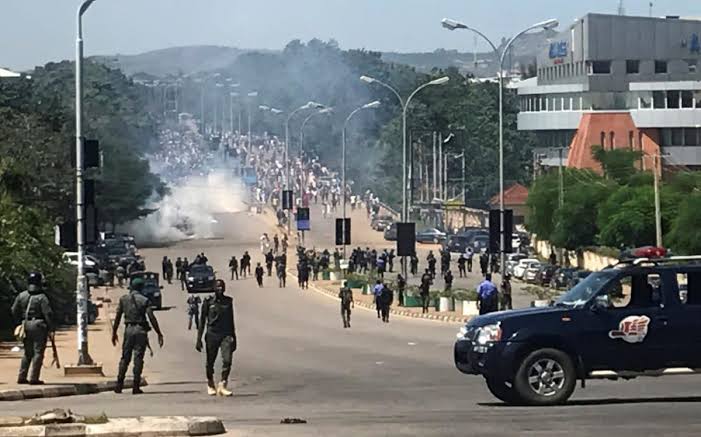
Ogun State youths protesting in October 2020. The arrested protesters were also quickly charged to court with ridiculous sentences such as 14 years’ imprisonment to death sentences hanging above their heads. However, lawyers for the #EndSARS sprung into action to free them.
The state governor, Dapo Abiodun, gave direct orders to release all arrested in connection with the protest and that all charges against them should be dropped. Popular musician Femi Kuti joined the protesters in Ogun State.
Protests in other states
Other states where protests also took place include Abia, Ebonyi State, Osun State, Imo State, Plateau State and Anambra State. Arrests were also recorded in these states as well.
International response
The #EndSARS hashtag was the top trending hashtag worldwide for two days and drew international attention. Notable international figures like Kanye West, Trey Songz, Marcus Rashford, Mesut Ozil, Tammy Abraham, Viola Davis, Bishop T.D Jakes, Naomi Campbell, Drake, Big Sean, CardiB, John Boyega and many others lent their support to the protesters. They used the hashtag, #EndSARS in their tweets giving it more engagements.
CNN has also been airing news of the protests in Nigeria and the media house’s Lagos correspondent, Stephanie Busari, has been doing well in ensuring that the facts about the #EndSARS protests are well known.
You may also read: Bishop T.D Jakes lends voice to #EndSARS protest
Nigerians in the diaspora have also carried out protests in various cities of the world. In London, #EndSARS protesters have occupied the grounds outside the Nigeria High Commission. Nigerian in Dublin protested outside the Nigerian Embassy in Saint Peter’s. In New York, they marched in protest to the Nigerian Consulate in Midtown.
Twitter CEO, Jack Dorsey, tweeted in support of the protest on 15th October 2020, he asked protesters to use bitcoin to donate towards the protest. Google Africa Team also tweeted in support of the protest as well.
Shortly after, Twitter launched an #EndSARS emoji, so whenever #EndSars is typed on Twitter, an emoji of a shrouded fist coloured green, white, green appears in front of the hashtag.
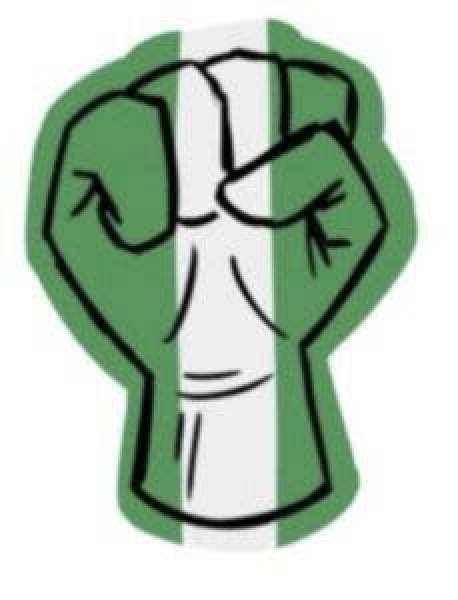
On Friday, 16th October 2020, the hacktivist group, Anonymous, claimed responsibility for hacking the Twitter handle of the National Broadcasting Commission and started posting Tweets in support of the #EndSARS movement.
Nigerian government response
The deputy governor of Lagos State, Femi Hamzat, openly condemned the police behaviour of indiscriminate harassment of youths.
The Lagos State House of Assembly also held an emergency meeting on 9th October 2020 to consider the demands of the #EndSars protesters.
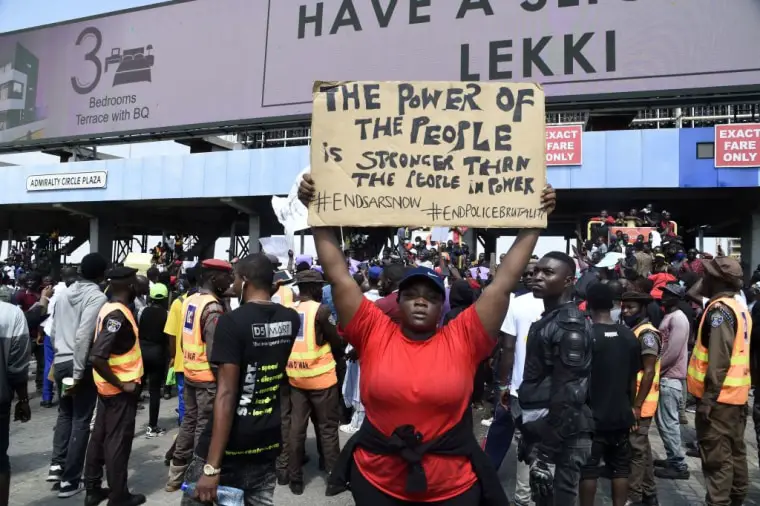
According to a report by the Guardian newspaper, the State House of Assembly concluded that the following courses of action should be undertaken:
- Nigeria’s Senate and House of Assembly should probe FSARS
- The commissioner of police should protect protesters
- Molestation of youths should be stopped henceforth
- An institution of public enquiry on the extrajudicial killings should be put together by Senate President and the House of Representatives Speaker
- SARS should be banned and replaced with a new unit with a clear code of conduct and sanction of illegalities.
At the federal level, the Inspector General (IG) of the Nigeria Police Force, Mohammed Adamu, announced that the Special Anti-Robbery Squad (SARS) has been dissolved on Sunday, 11th October 2020. The announcement was not enough because the same pronouncement had been made in 2017, 2018 and 2019 with no observable change.
Governors of Oyo State and Delta State, Seyi Makinde and Ifeanyi Okowa urged the police to not engage the peaceful protesters and to allow them to move about freely.
The public relations officer of the Nigerian Police Force, Frank Mba, announced on Tuesday, 13th October that a new Special Weapon and Tactics Team (SWAT) unit will replace SARS. This gave birth to a new hashtag, #EndSWAT. Young Nigerians claimed that the Federal government was simply changing the name of the old unit and that nothing will really change with SWAT.
The same day, Femi Adesina, the spokesperson to President Muhammadu Buhari, released a statement claiming that the government will agree to the five demands of young Nigerians. Additionally, President Muhammadu Buhari tweeted on Friday 9th October 2020 that he ordered the IGP to reform the police and ensure that the police are fully accountable to the people.
President Buhari’s address
On Thursday, 22 October 2020, President Muhammadu Buhari addressed the nation for the second time since the protests started. He had initially only acknowledged the EndSARS protest on Monday 12th October 2020 without saying much.
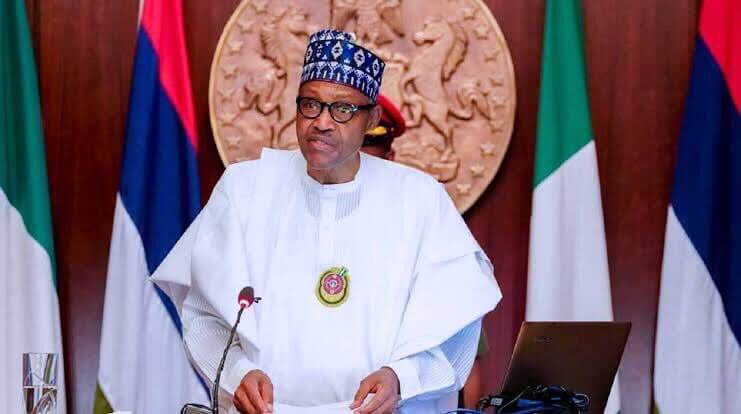
During his speech Thursday broadcast speech, he made some of the following key announcements:
— Thugs who have hijacked the ‘initial, genuine and well-intended protest’ were warned to desist from their acts of violence.
— The government had accepted the five-point demand of the ‘legitimate’ EndSARS protesters but it seemed some have mistaken the move as ‘a sign of weakness’.
— The government is saddened by the loss of lives and destruction of properties resulting from the violence that has been going on in the country.
— There is a ‘broad plan’ to lift 100 million Nigerians out of poverty in the next 10 years; the creation of N75 billion National Youth Investment Fund to provide opportunities for the youths and the Micro, Small and Medium Enterprises (MSME) Survival Fund.
— The Federal Government is committed to preserving the unity of Nigeria and will continue to improve good governance and democratic process via sustained engagement, ensuring liberty, freedom, fundamental rights, and protecting lives and properties.
— Neighbouring countries and members of the international community are to seek all available facts and refrain from hastily taking sides, making judgments or pronouncements.
— Youths should discontinue the street protests and constructively engage (the) government in finding solutions as their demands have been heard and are being worked on.
There were many negative feedbacks after President Muhammadu Buhari delivered his speech on 22nd October 2020. One of the major ones had to do with people criticising him for not mentioning the massacre that happened at Lekki tollgate.
Others also condemned how the speech was delivered. Femi Fani-Kayode, a Nigerian politician tweeted:
Buhari’s speech was an insult to our people, a disgrace to humanity & a stench in the nostrils of God.
He is not warm, he is cold. He is not kind, he is cruel. He is not empathetic, he is sociopathic.
He is not a President,he is a dictator. He is not a man, he is a monster.1/3 pic.twitter.com/cnjswK3Oha
— Femi Fani-Kayode (@realFFK) October 23, 2020
Reno Omokri also said: “Listening again to General @MBuhari’s speech, all I saw was blame. Nothing is ever Buhari’s fault. #EndSARS is the fault of #LazyNigerianYouths, and not a President that has refused to try rogue cops. Buhari is a poster boy for the saying that when you are lame, you love to blame.”
Former Governor of Ekiti State, Peter Ayodele Fayose Tweeted in response to Buhari’s speech: “Mr President has never disappointed me. Nothing else can be lifeless than the President’s Speech. Those who brought this CHANGE should enjoy the NEXT/NEW LEVEL while it lasts.”
Aisha Yesufu, one of the leading voices of the EndSARS protest said: “Not a word from Buhari @MBuhari about #EndSars protesters killed. Not a word about citizens killed in Zamfara. You still have doubt that this man cares for no one and everyone is feeling the effect of his incompetence?”
Omoyele Sowore Tweeted as well: “EMPTY Speech and then they play the national anthem under Which they shot and killed #LekkiProtest activists, just gut-wrenching!”
Nigerian actress, Uche Jombo Rodriguez said: “That speech… E shock me…l can’t even lie.”
Several other reactions are too many to name.
Some others even argued that the speech was prerecorded and was not broadcast Live as Buhari’s administration claimed. It further fueled the argument that the President of Nigeria was likely dead and a look-alike was being paraded as him. People alleged that the president’s lips were not moving in sync with the sounds being produced.
Conclusion
The protest to scrape SARS and end police brutality in Nigeria was one of the biggest that the country has ever seen since its independence. Definitely, it is the biggest one since Nigeria’s return to democracy. The demand is simple; put an end to the deadly SARS unit and punish officers who are guilty of inhumane actions.
It is truly a momentous event in the country’s history. Even more symbolic is the fact that the protests began just less than two weeks after the country celebrated its 60th independence anniversary on 1st October 2020.

